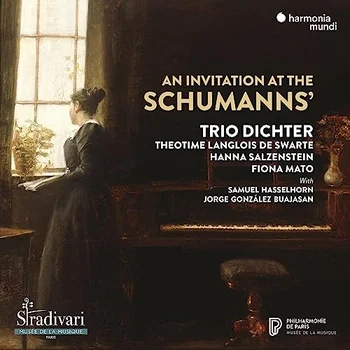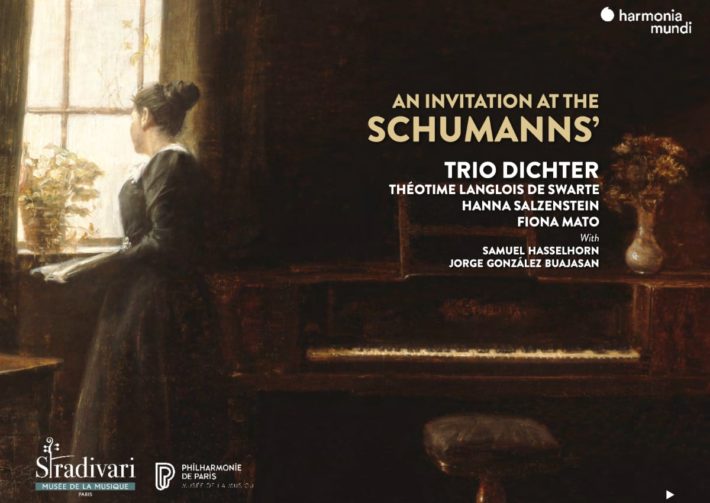A couple of years ago, I reviewed an interesting album by violinist Théotime Langlois de Swarte that brought us into the realm of the Proustian salon concert. de Swarte returns with Trio Dichter in a recital that is an imagined reconstruction of a concert in the Schumann’s living room.

The trio members stay true to the era with period instruments. For pianist Fiona Mato, this is an 1890 Bösendorfer; for cellist Hanna Salzenstein, a 1734 Guarneri; and for de Swarte, a 1700 Gagliano. The intimacy of a salon concert also rests on the choice of pieces and the group fittingly offers a musical amuse bouche of smaller works like songs, one of Bach‘s Little Preludes, a Scarlatti sonata, and a Schumann trio.
Widmung, as one of Schumann‘s quintessential lieder, proves interesting to hear in the context of period instruments. At first, the Bösendorfer’s cavernous timbre might take some getting used to but it is this distinct sound that, with Mato’s emphatic contouring, breathes life into the ebb and flow of the arpeggios. The performers do try a little too hard to capture the hopeful buoyancy of the opening section, sounding somewhat nervous. After they settle down, though, is when we can better appreciate baritone Samuel Hasselhorn’s lyricism and his responsiveness to Schumann’s striking harmonic color shifts.
Among the selections are some arrangements of Schumann’s character pieces for solo piano. The first piece from Kinderszenen (track 8) doesn’t create a fuss with complexity, and the result is a spotlight on a tender dialogue between melody and accompaniment. de Swarte’s approach to this melody is minimalistic where vibrato and contouring is concerned, but this artistic choice is the right one: coupled with Schumann’s coy phrasing, we hear a voice that is as reflective as it is dreamy and wistful. Mato’s piano line treads rather cautiously but still offers a gentle backdrop for the violin.
Another undoubtedly familiar selection the trio features is Brahms‘ Wegenlied. Like Widmung, this is a lied whose piano accompaniment sounds simple enough but, depending on interpretation and presentation, can have a profound impact on a static vocal line. The performance is generally nice but a closer listen reveals a few issues. Momentary yet noticeable rhythmic inconsistencies in the piano part unfortunately break the legato and continuity. Hasselhorn does the needful to maintain melodic integrity through his skillful breath control but could show even more nuance to evoke the lullaby’s character. The Jonas Kaufmann/Helmut Deutsch version (Sony Classical) is top-notch in this regard with its beautifully managed sostenutos and shades of piano.
As for the larger works, Schumann’s Trio in F major makes for an enjoyable listen with the defining personalities of each movement coming through. In the sprightly Sehr Lebhaft, the instrumentalists approach their respective parts with ample detail in articulation and phrase shaping. This allows individual presences to be heard even in the busiest ensemble moments; the contrapuntal moments, too, are delightfully light and pristine. The slow third movement is where the trio best embodies the intimacy and sophistication of the salon environment. We can even hear the breathing cues which make us feel proximally close to the performers. The sad character of the music, while perceptible, is still tinged with an elegance thanks to Swarte’s fine bowing and vibrato.
The trio’s intelligently written liner notes take us through the program and explain how each work ties into the theme. A welcome addition is the description of the period instruments in both a technical and historical context (though a paragraph on the violin is conspicuously absent). When it comes to sound engineering, I found it to be uneven. Sometimes, the piano and other instruments didn’t sound well-balanced, but at other times, they were better coordinated in the same piece of music.
While individual works may not always be striking enough to replace original versions or reference recordings, Trio Dichter does present a thoughtful curation that gives satisfying insight into a historical listening experience.
Recommended Comparisons
Argerich | Kaufmann | Gould | Trio Wanderer
An Invitation at the Schumanns‘
Trio Dichter
Samuel Hasselhorn – Baritone
Jorge Gonzáles Buajasan – Piano
Harmonia Mundi, CD HMM902509



















